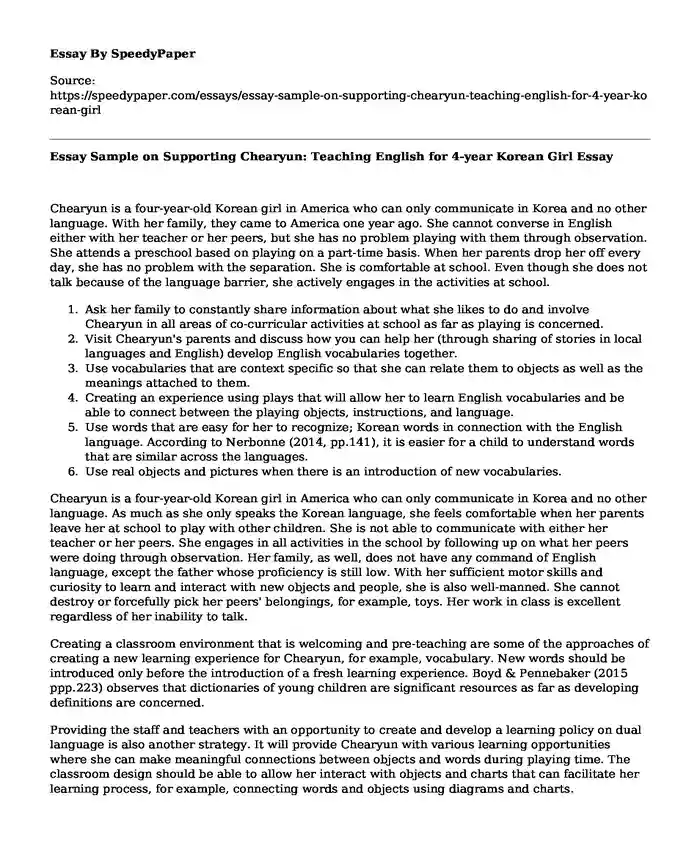Chearyun is a four-year-old Korean girl in America who can only communicate in Korea and no other language. With her family, they came to America one year ago. She cannot converse in English either with her teacher or her peers, but she has no problem playing with them through observation. She attends a preschool based on playing on a part-time basis. When her parents drop her off every day, she has no problem with the separation. She is comfortable at school. Even though she does not talk because of the language barrier, she actively engages in the activities at school.
- Ask her family to constantly share information about what she likes to do and involve Chearyun in all areas of co-curricular activities at school as far as playing is concerned.
- Visit Chearyun's parents and discuss how you can help her (through sharing of stories in local languages and English) develop English vocabularies together.
- Use vocabularies that are context specific so that she can relate them to objects as well as the meanings attached to them.
- Creating an experience using plays that will allow her to learn English vocabularies and be able to connect between the playing objects, instructions, and language.
- Use words that are easy for her to recognize; Korean words in connection with the English language. According to Nerbonne (2014, pp.141), it is easier for a child to understand words that are similar across the languages.
- Use real objects and pictures when there is an introduction of new vocabularies.
Chearyun is a four-year-old Korean girl in America who can only communicate in Korea and no other language. As much as she only speaks the Korean language, she feels comfortable when her parents leave her at school to play with other children. She is not able to communicate with either her teacher or her peers. She engages in all activities in the school by following up on what her peers were doing through observation. Her family, as well, does not have any command of English language, except the father whose proficiency is still low. With her sufficient motor skills and curiosity to learn and interact with new objects and people, she is also well-manned. She cannot destroy or forcefully pick her peers' belongings, for example, toys. Her work in class is excellent regardless of her inability to talk.
Creating a classroom environment that is welcoming and pre-teaching are some of the approaches of creating a new learning experience for Chearyun, for example, vocabulary. New words should be introduced only before the introduction of a fresh learning experience. Boyd & Pennebaker (2015 ppp.223) observes that dictionaries of young children are significant resources as far as developing definitions are concerned.
Providing the staff and teachers with an opportunity to create and develop a learning policy on dual language is also another strategy. It will provide Chearyun with various learning opportunities where she can make meaningful connections between objects and words during playing time. The classroom design should be able to allow her interact with objects and charts that can facilitate her learning process, for example, connecting words and objects using diagrams and charts.
Moreover, it is also essential to create a classroom routine that will help Chearyun forestall the incoming activity. This strategy will get her prepared to learn new things, words, and vocabularies. Lastly, supporting Chearyun in the classroom, as far as altering is concerned, can entail the use of diagrams, charts, pointing or gestures (Frost et al., 2016). It will help her learn the vocabularies while matching it with the drawings or graphs at the same time, for example, drinking and eating.
References
Boyd, R. L., & Pennebaker, J. W. (2015). A way with words: Using language for psychological science in the modern era. Consumer psychology in a social media world, 222-236.
Frost, R. L. A., Gomez, R., Visagie, K., Christiansen, M. H., & Monaghan, P. J. (2016). How do high frequency words assist language acquisition in 12-month-olds?. In 1st Lancaster Conference on Infant and Child Development.
Nerbonne, J. (2014). The secret life of pronouns. What our words say about us. Literary and Linguistic Computing, 29(1), 139-142.
Cite this page
Essay Sample on Supporting Chearyun: Teaching English for 4-year Korean Girl. (2022, Jun 08). Retrieved from https://speedypaper.com/essays/essay-sample-on-supporting-chearyun-teaching-english-for-4-year-korean-girl
Request Removal
If you are the original author of this essay and no longer wish to have it published on the SpeedyPaper website, please click below to request its removal:
- HRM Essay Example: The Brooklyn Hospitality Employee Retention Program
- Essay Sample Prooving that Weight Loss Maintenance is Possible
- Essay Sample about Political and Social Change During the Early Meiji
- Essay Example Exploring Arguments Presented in Allan Moore's Watchmen
- Essay Sample: Bennett under Fire for Remarks on Blacks and Crime
- Paper Example on Manning University
- Essay Sample on Slipped Capital Femoral Epiphysis
Popular categories





